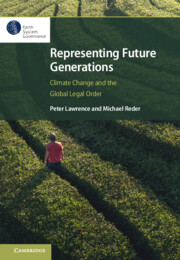Refine search
Actions for selected content:
52 results
5 - New Theory and Practice
-
- Book:
- Environmental Rights for Future Generations
- Published online:
- 11 October 2025
- Print publication:
- 30 October 2025, pp 92-125
-
- Chapter
- Export citation
9 - Conclusion
-
- Book:
- Environmental Rights for Future Generations
- Published online:
- 11 October 2025
- Print publication:
- 30 October 2025, pp 214-218
-
- Chapter
- Export citation
2 - The Rationale
-
- Book:
- Environmental Rights for Future Generations
- Published online:
- 11 October 2025
- Print publication:
- 30 October 2025, pp 16-39
-
- Chapter
- Export citation
8 - A UN Special Envoy for Future Generations
- from Part III - Case Studies
-
- Book:
- Representing Future Generations
- Published online:
- 19 September 2025
- Print publication:
- 09 October 2025, pp 200-219
-
- Chapter
- Export citation
6 - The ICJ Advisory Opinion on Climate Change and Proxy Representation of Future Generations
- from Part III - Case Studies
-
- Book:
- Representing Future Generations
- Published online:
- 19 September 2025
- Print publication:
- 09 October 2025, pp 145-177
-
- Chapter
- Export citation

Representing Future Generations
- Climate Change and the Global Legal Order
-
- Published online:
- 19 September 2025
- Print publication:
- 09 October 2025
14 - Intergenerational Equity
- from Part III - Regime Interaction and Interpretation
-
-
- Book:
- The Cambridge Handbook on Climate Litigation
- Published online:
- 03 June 2025
- Print publication:
- 31 July 2025, pp 344-368
-
- Chapter
-
- You have access
- Open access
- HTML
- Export citation
Climate Migration, Moral Dilemmas, and Moral Motivation
-
- Journal:
- Ethics & International Affairs / Volume 39 / Issue 1 / Spring 2025
- Published online by Cambridge University Press:
- 22 July 2025, pp. 37-49
-
- Article
-
- You have access
- Open access
- HTML
- Export citation
Bending the Arc of Law: Positivism Meets Climate Change’s Intergenerational Challenge
-
- Journal:
- Transnational Environmental Law / Volume 14 / Issue 2 / July 2025
- Published online by Cambridge University Press:
- 08 April 2025, pp. 285-311
-
- Article
-
- You have access
- Open access
- HTML
- Export citation
On synchronic direct intergenerational reciprocity: a reply to Corvino
-
- Journal:
- Economics & Philosophy / Volume 41 / Issue 3 / November 2025
- Published online by Cambridge University Press:
- 12 March 2025, pp. 654-670
-
- Article
- Export citation
The Ethics of Nuclear Energy: Technological Advancements and the Need for Revised Theological Guidance
-
- Journal:
- New Blackfriars / Volume 106 / Issue 3 / May 2025
- Published online by Cambridge University Press:
- 19 February 2025, pp. 187-202
- Print publication:
- May 2025
-
- Article
- Export citation
Kant on Hope’s Value and Misanthropy
-
- Journal:
- Canadian Journal of Philosophy / Volume 53 / Issue 6 / August 2023
- Published online by Cambridge University Press:
- 18 December 2024, pp. 472-486
-
- Article
-
- You have access
- Open access
- HTML
- Export citation
10 - Nature’s Future
-
- Book:
- Ethics and the Environment
- Published online:
- 29 November 2024
- Print publication:
- 28 November 2024, pp 198-233
-
- Chapter
- Export citation
Egalitarianism across Generations
-
- Article
-
- You have access
- Open access
- HTML
- Export citation
Children and Future Generations Rights before the Courts: The Vexed Question of Definitions
-
- Journal:
- Transnational Environmental Law / Volume 13 / Issue 3 / November 2024
- Published online by Cambridge University Press:
- 27 September 2024, pp. 522-546
-
- Article
-
- You have access
- Open access
- HTML
- Export citation
The idea of protecting cultural heritage for the benefit of future generations in international cultural heritage law
-
- Journal:
- International Journal of Cultural Property / Volume 32 / Issue 1 / February 2025
- Published online by Cambridge University Press:
- 23 September 2024, pp. 76-99
-
- Article
-
- You have access
- Open access
- HTML
- Export citation
Chapter 9 - Intra- and Intergenerational Justice, Law, and DOHaD
- from Section 2 - The Social Life of DOHaD
-
-
- Book:
- The Handbook of DOHaD and Society
- Published online:
- 20 June 2024
- Print publication:
- 27 June 2024, pp 117-130
-
- Chapter
-
- You have access
- Open access
- HTML
- Export citation
Intergenerational Justice and Freedom from Deprivation
-
- Article
-
- You have access
- Open access
- HTML
- Export citation
1 - Indigenous Philosophy and Intergenerational Justice
- from Part I - Indigenous Philosophies on Justice between Generations
-
-
- Book:
- Intercultural Philosophy and Environmental Justice between Generations
- Published online:
- 14 March 2024
- Print publication:
- 21 March 2024, pp 17-32
-
- Chapter
- Export citation
2 - Climate Ethics and Intergenerational Reciprocity in Indigenous Philosophies
- from Part I - Indigenous Philosophies on Justice between Generations
-
-
- Book:
- Intercultural Philosophy and Environmental Justice between Generations
- Published online:
- 14 March 2024
- Print publication:
- 21 March 2024, pp 33-58
-
- Chapter
- Export citation
